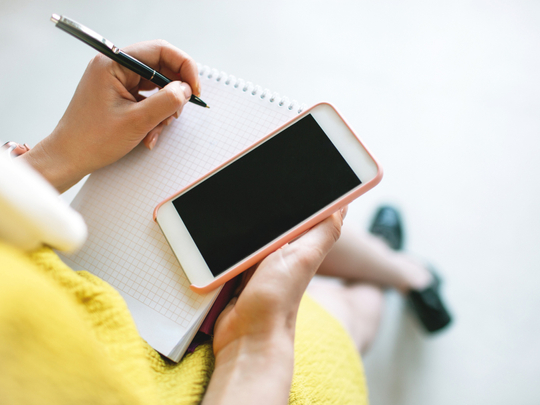
We spoke to the experts at Net Credit and collected these hacks to help you perform well in your phone interview. Most companies, especially in the UAE, tend to start off with a phone interview before shortlisting for a face to face meeting; not to mention companies hiring from outside the country. Face-to-face interviews have the advantage of body language for correct communication, while phone interviews can remove a bit of the intimidation that candidates might feel in person. Being confident is key in both cases.
Before the interview
1. Voicemail
This is extremely important for jobseekers who are already working and might be unavailable to take calls at some points of time during the day. While emails often precede an interview call, the HR team might contact you to get more information or for any other reason without notice. Record a short and clear message stating your name, asking for a return phone number and a timeframe or message.
2. No-guilt cheat notes
A big advantage of phone interviews is that with the help of resources that your interviewer cannot see, you can make an even better impression than you would face to face. Have a sheet of notes about the company, about your role and your thoughts prepared well in advance. You may have 99 per cent of it in your head, but having that sheet can help you refer and engage more with your interviewer.
3. 10 minutes of prep
Just because it is a phone interview, you cannot slouch on the sofa until the call comes through. Get seated in a comfortable chair in which you can sit with your back straight and be comfortable. Keep your cheat notes on the desk in front of you. Move any distracting items off the table. Warm up– draw out the English vowels in a loud sing song voice to open up your voice and get used to hearing it. This prep is extremely important for your confidence during the call.
4. Notifications off
Silencing your phone or tablet or laptop isn’t enough. Remove any vibrating notifications or call waiting signals. On your phone, switch off Wi-Fi or other internet connectivity. Ensure that there is no chance of such interruption which might make you misunderstand or fail to hear a question.
During the interview
5. Use your notes
When we get into the call, it is easy to forget your best companion – that sheet of paper you prepared earlier. Whenever prompted or when silences fall, use the notes to trigger something interesting to say to the interviewer. Connect what he or she is saying to the notes and bring up your achievements and interests.
6. Make more notes
While he or she is speaking, note down salient points. If they talk about something in your notes, record it adjacent to the relevant points. You could also start on a fresh sheet to keep a clear head. While we may think that we are going to remember everything the interviewer mentioned, the stress or tension of the moment might make you forget. Use phrases or words to shorthand your conversation.
7. Posture and pose
You might already notice this while you’re on the phone. Talking to someone who is sitting at work in a chair and speaking to someone lounging comfortably on the sofa sounds different. Sit with your back straight and your chest out, it has been proven that it reflects in your voice and tone. You’d always know if someone was smiling in a phone conversation; so use a smile where necessary to show the interviewer that you are confident.
8. Only human
No matter how prepped you are, it is possible that some interruptions can occur at some point. If that happens, be confident in sharing it with the interviewer. Not only will it make you feel better when you aren’t trying to talk and avoid the interruption at the same time, it will also give you a window of opportunity to talk a little more casually about your circumstances with the interviewer. It’s all about making a connection.
9. Timeframe for follow up
End the conversation with a follow-up query. You can ask for a time frame, for example, “Would you mind if I follow up in a week’s time?” Following up too soon or too often can come across as unprofessional. In case, you aren’t given a timeframe, follow up in a week’s time.
After the interview
10. Post-call email and final follow up
Just like you would with a normal interview, send a thank you email after the call. Since there is no travel time or gap in a phone interview, sending a note within two hours is acceptable. Thank the interviewer for their time and show your interest in talking to them in person. In case you come to know that you haven’t been successful, send a note asking for feedback and also to keep you on file for relevant roles. This will leave a good impression, and chances are, they might seek you out for the next possible position.
11. Don’t connect yet
It is normal to feel like the interviewer or HR Manager should now connect with you over professional social media channels like LinkedIn. However, sending a connection request before things are sorted does not come across as professional. Include links to your professional accounts in your email signature as you send your follow-up note above, and let them connect with you.











